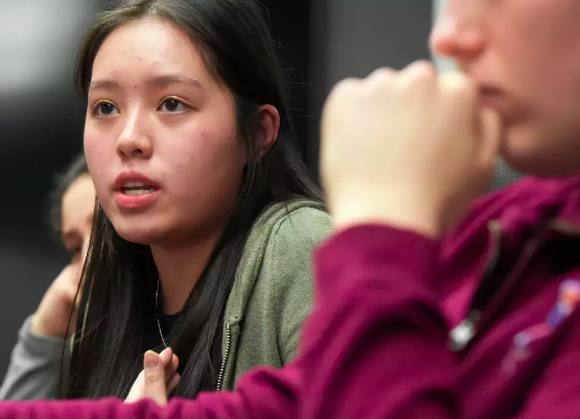
On Monday, March 4th, Democratic Senator Richard Blumesthal, accompanied by Danbury Mayor Roberto Alves and Interim Superintendent Kara Casmiro, visited Danbury High School and, with a group of DHS students, discussed his new social media bill, the Kids Online Safety Act.
Reporting on the discussion was News Times reporter Michael Gagne, who later published an article summarizing the event and many of the opinions of both students attending and Mr. Donovan.
Out of the several students who attended, many, including seniors Pearl Chia and William Sweeney, were prepared with several concerns and questions regarding the bill, specifically its target on algorithms. Among those students, some were similar to Chia and not only questioned the bills’ take on algorithms but also Blumenthal’s overall stance on the concept.
According to Chia, she perceived Blumenthal’s stance as “contradictory.” Specifically, his response was when one of the students attending the conference explained that algorithms are not necessarily evil and are following instructions to complete a problem. To that opinion, Blumenthal responded that the goal isn’t to completely erase algorithms but rather to have the option for youth to “disconnect from the algorithms entirely.” However, when Chia followed up on this statement, requesting for the Senator to expand on his definition of “disconnect,” he explained that algorithms should not exist, as “the algorithms aren’t working.” Chia questioned if that meant that entire feeds would no longer be personalized, and he agreed. Chia then responded, “If that were to happen, a lot of people would lose interest in social media. They go on social media to consume stuff they’re interested in. I think if social media were to be totally randomized, it would remove a lot of opportunities, [and people] would lose interest.”
Sweeney, another student attendee of the conference, agreed with Chia’s assessment of the conversation, noting that the current algorithms allow for “independent journalists, freelancers, and other smaller content creators to reach an audience that is interested in their work.”
Sweeney elaborated on the topic at hand, stating, legally, “the bar” for regulating companies without backlash is “almost insurmountable to pass.” While Blumenthal responded that he was “hoping for the best,” Sweeney still strongly believes that due to “public backlash,” the bill will only wind up in court on the grounds of “being in violation of the First Amendment.”
With examples such as the widely considered “sinophobic” trial against Singaporean Tiktok CEO earlier this year, students attending the conference raised concerns over the legitimacy and efficacy of this bill. The group discussed how current social media algorithms are exacerbating xenophobia, but some students are worried that concerns raised over regulating certain social media platforms, such as TikTok, are fueled by sinophobic intentions. Senators also indicated in that trial that many of them are “unfamiliar with changes and growth in technology,” which makes bills like KOSA, entirely centered around current technology, “matters of concern the public should pay attention to,” according to Sweeney.
With all of that in mind, it can be seen that despite representatives’ efforts to understand students’ concerns about the limitations of social media algorithms put in place by KOSA, many still question whether its benefits will truly outweigh the effect of limiting such a prevalent outlet of speech for millions of people and students around the country.





















